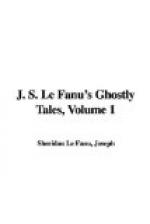An Account of Some Strange Disturbances in Aungier Street
It is not worth telling, this story of mine—at least, not worth writing. Told, indeed, as I have sometimes been called upon to tell it, to a circle of intelligent and eager faces, lighted up by a good after-dinner fire on a winter’s evening, with a cold wind rising and wailing outside, and all snug and cosy within, it has gone off—though I say it, who should not—indifferent well. But it is a venture to do as you would have me. Pen, ink, and paper are cold vehicles for the marvellous, and a “reader” decidedly a more critical animal than a “listener.” If, however, you can induce your friends to read it after nightfall, and when the fireside talk has run for a while on thrilling tales of shapeless terror; in short, if you will secure me the mollia tempora fandi, I will go to my work, and say my say, with better heart. Well, then, these conditions presupposed, I shall waste no more words, but tell you simply how it all happened.
My cousin (Tom Ludlow) and I studied medicine together. I think he would have succeeded, had he stuck to the profession; but he preferred the Church, poor fellow, and died early, a sacrifice to contagion, contracted in the noble discharge of his duties. For my present purpose, I say enough of his character when I mention that he was of a sedate but frank and cheerful nature; very exact in his observance of truth, and not by any means like myself—of an excitable or nervous temperament.
My Uncle Ludlow—Tom’s father—while we were attending lectures, purchased three or four old houses in Aungier Street, one of which was unoccupied. He resided in the country, and Tom proposed that we should take up our abode in the untenanted house, so long as it should continue unlet; a move which would accomplish the double end of settling us nearer alike to our lecture-rooms and to our amusements, and of relieving us from the weekly charge of rent for our lodgings.
Our furniture was very scant—our whole equipage remarkably modest and primitive; and, in short, our arrangements pretty nearly as simple as those of a bivouac. Our new plan was, therefore, executed almost as soon as conceived. The front drawing-room was our sitting-room. I had the bedroom over it, and Tom the back bedroom on the same floor, which nothing could have induced me to occupy.
The house, to begin with, was a very old one. It had been, I believe, newly fronted about fifty years before; but with this exception, it had nothing modern about it. The agent who bought it and looked into the titles for my uncle, told me that it was sold, along with much other forfeited property, at Chichester House, I think, in 1702; and had belonged to Sir Thomas Hacket, who was Lord Mayor of Dublin in James II.’s time. How old it was then, I can’t say; but, at all events, it had seen years and changes enough to have contracted all that mysterious and saddened air, at once exciting and depressing, which belongs to most old mansions.




